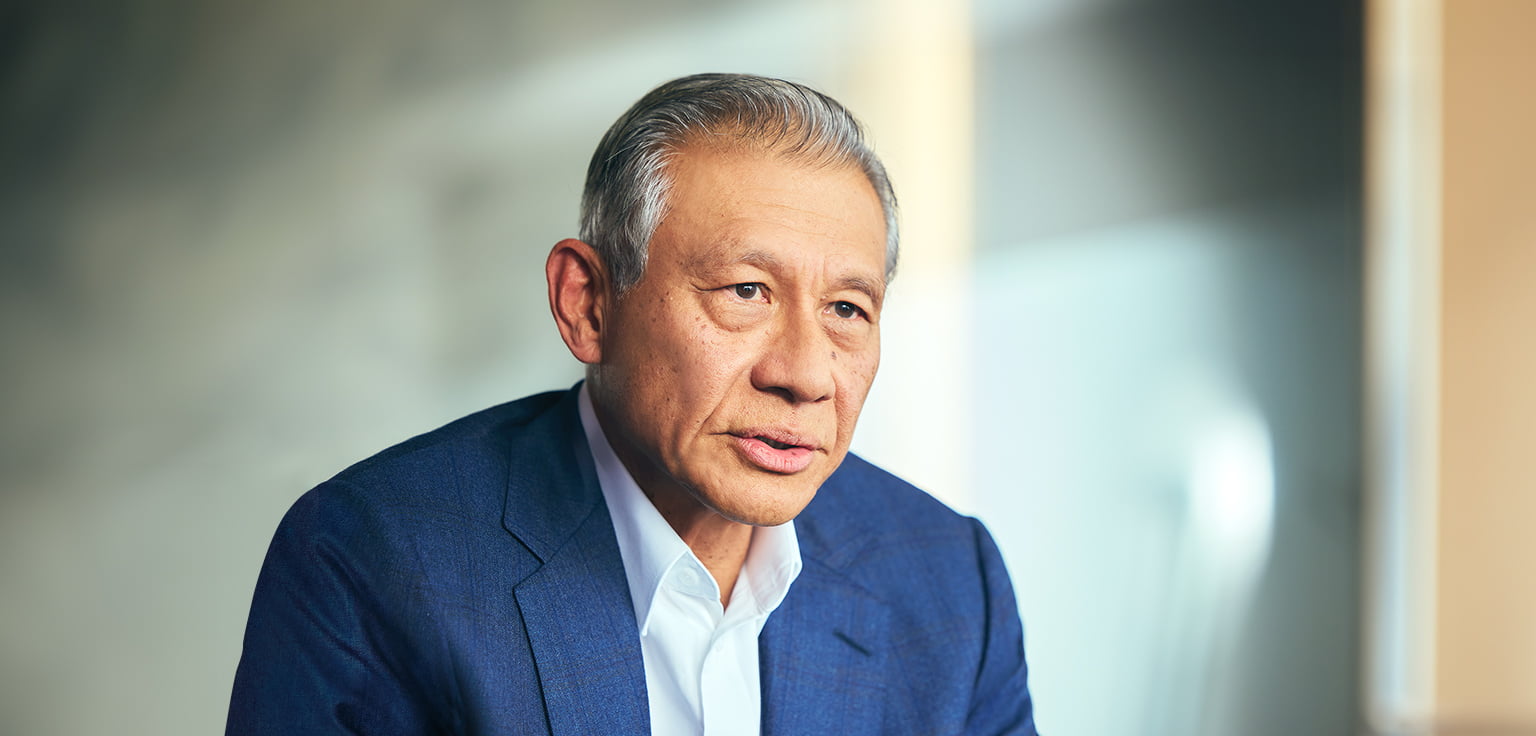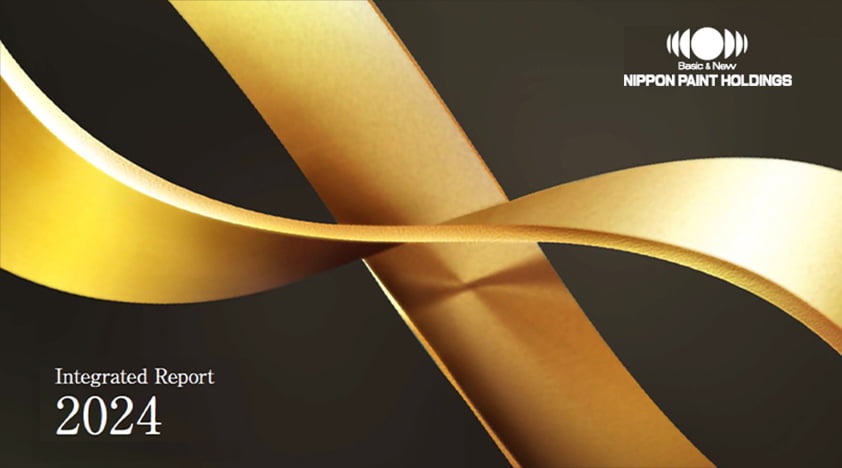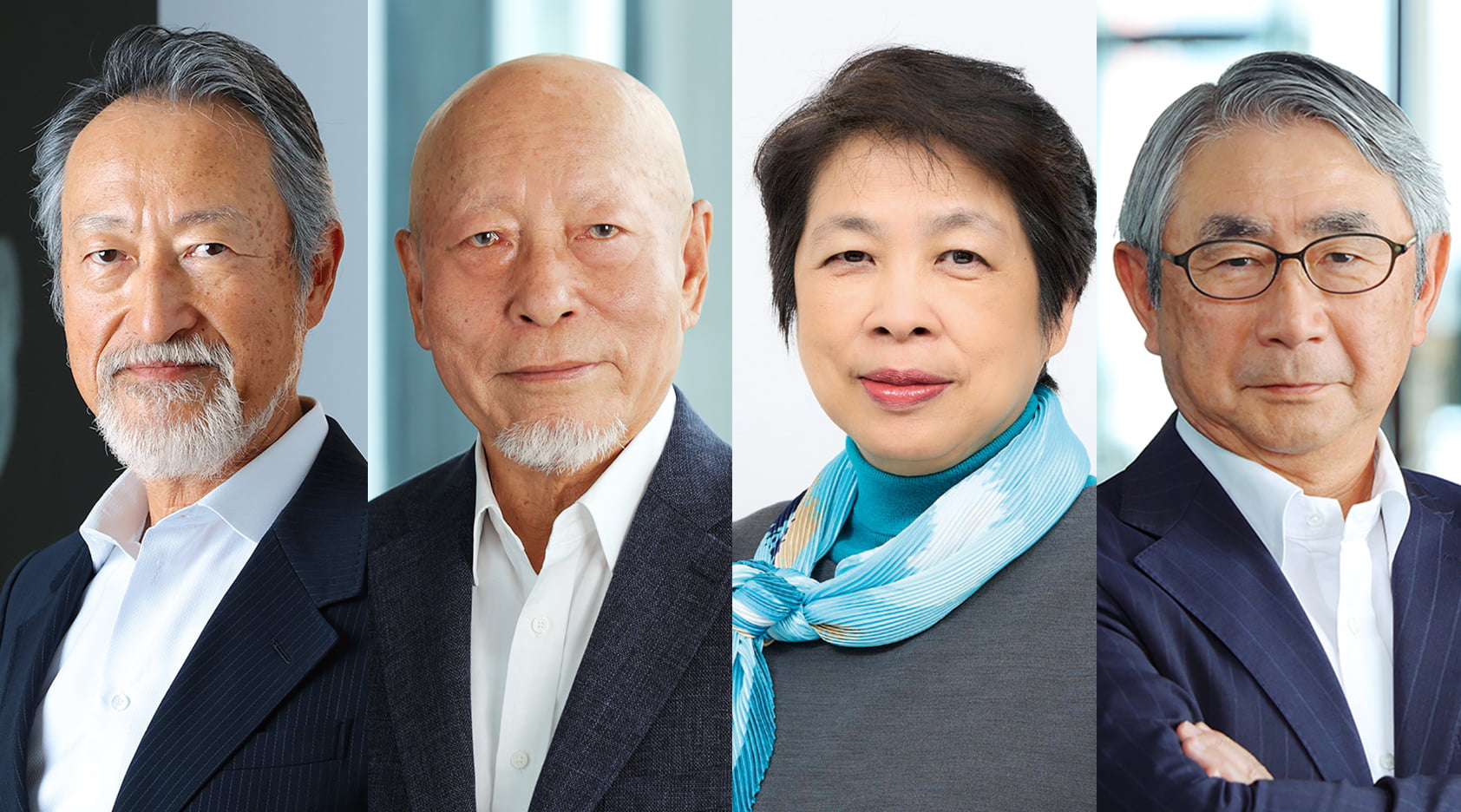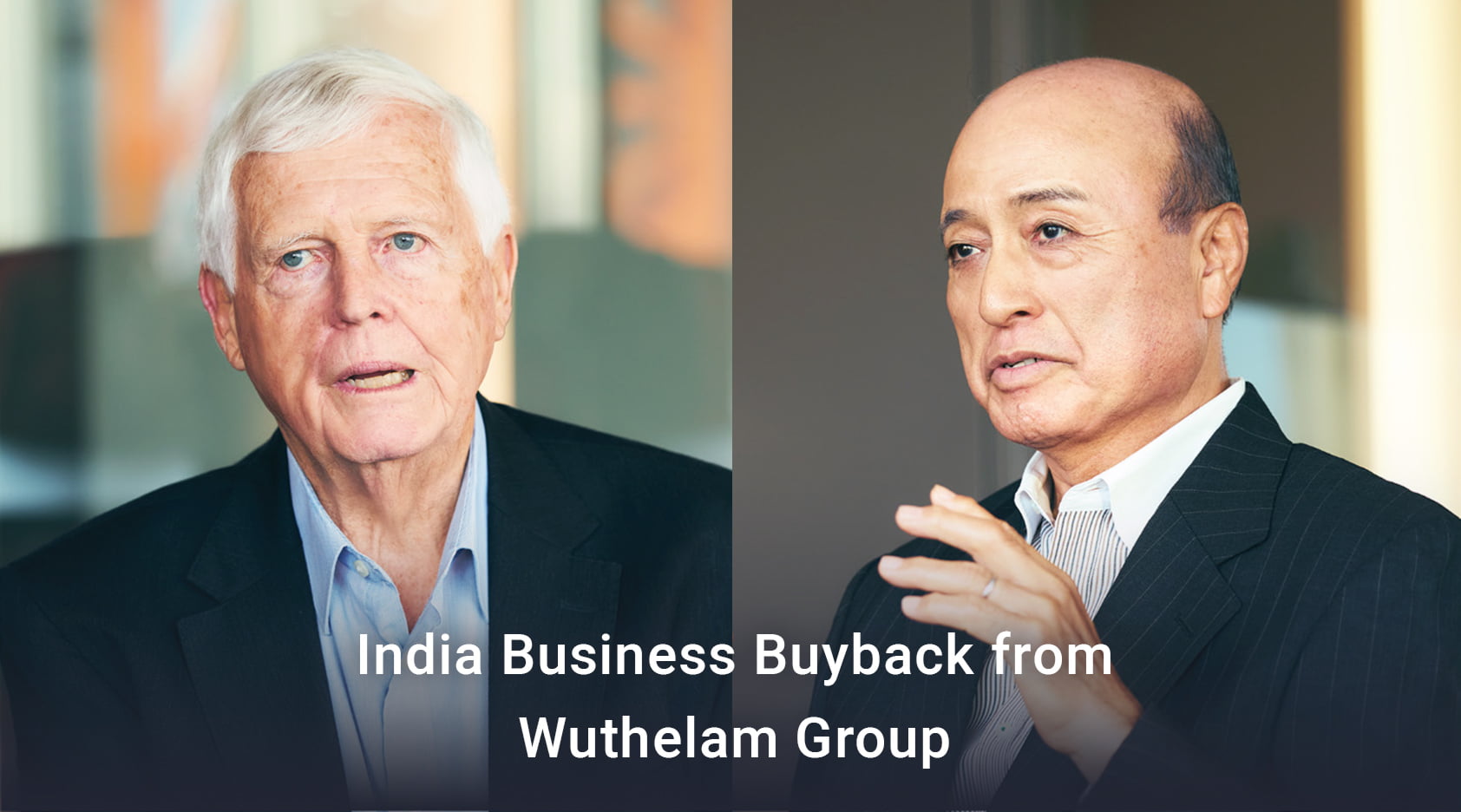
Toward Corporate Governance in Pursuit of MSV
In the past three integrated reports, we have covered the evolution of our corporate governance in the format of a talk session between the Board Chair and the Chairperson of the Nominating Committee (2021), the Compensation Committee (2022), and the Audit Committee (2023).
Our Board comprises the Co-Presidents representing the management, the majority shareholder Wuthelem Group (58.7% ownership of the Company), and Independent Directors accounting for 67% of the Board composition. The Board has sought to build the current governance structure around its shared common value—Maximization of Shareholder Value (MSV), which is the sole mission of Nippon Paint Group and the compass for the Board’s decision-making.
In the latest integrated report, Lead Independent Director Nakamura (Board Chair) discusses the evolution of our corporate governance with Chairman Goh, also representing the Wuthelem Group, and explores the essence of our governance.


(Managing Director,
Wuthelam Holdings Ltd.)
Nakamura
and Board Chair
1. Looking back at the governance reforms
| Nakamura | Mr. Goh, among the members of the Board, you have by far the longest association with Nippon Paint. When did your involvement with the Company begin? |
|---|---|
| Goh | My initial association goes back to 1979. I briefly worked at an instant noodle company Nippon Paint* used to operate in California as part of its business diversification efforts. The Vietnam War ended in 1975, and political unease was prevalent everywhere. Shortly after, I became involved in Wuthelem Group’s paint JVs with Nippon Paint (the NIPSEA business) and saw clear prospects in these operations. It must have been a few years later, around 1982, when I came to firmly believe that Wuthelem should just focus on its paint business. At the time, we ran a variety of businesses, including real estate; paint was only one of our many endeavors, and it was barely profitable. While continuing to advocate Wuthelem’s consolidation into just the paint business, I led our entry into the paint market in China from 1992. Then, in the aftermath of the Asian financial crisis in 1997, I finally managed to consolidate Wuthelem’s operations into just paint. *Nippon Paint Co., Ltd. Renamed Nippon Paint Holdings Co., Ltd. (“NPHD”) upon adopting a holding company structure in 2014. |
| Nakamura | So you have a 45-year relationship with Nippon Paint. I understand the success of the paint business in China prompted Nippon Paint to wish to gain a majority interest in NIPSEA, raising its stake in the paint JVs from 40% to 51%. In turn, the Wuthelem Group came to hold 39% of NPHD in 2014, and you joined the NPHD Board as Director. At the time, the concept of corporate governance as understood in e.g. the US was still very new to the Japanese market, and ideas like “a publicly traded company belongs to the shareholders” or “a company must ensure shareholders of the transparency and fairness of its decision-making” were widely accepted. |
| Goh | I personally think that, when it comes to a publicly traded company, the concept of the company “belonging to somebody” is meaningless. Shareholders are only one of the company’s many stakeholders, each with specific rights of its own. That being said, among shareholders’ rights also lies the right to unlimited value. |
| Nakamura | That is indeed the fundamental premise of MSV. Going back to 2014, what was Nippon Paint’s Board like then? |
| Goh | In those days, Nippon Paint’s Board was essentially its management team. In that sense, there was less awareness that the Board represented the shareholders’ interests. A few years down the road, Nippon Paint began attempting to expand overseas on its own through M&A. It considered many acquisitions, aspiring in all cases to establish global presence in a certain business segment. Attention was barely paid to the deals’ impact on EPS and other financial aspects. For companies looking to globalize, generating shareholder value was not necessarily the purpose of acquisitions back then, and Nippon Paint was no exception. I personally believed that MSV was the sole mission of a publicly traded company, so our approaches toward governance should be different. |
| Nakamura | I understand that was the background of Wuthelem Group’s shareholder proposal in 2018. Wuthelem’s business investments at the time were 39% of NPHD, 49% of the NIPSEA business, and 100% of PT Nipsea (paint business in Indonesia). As an investor seeking to maximize the value of these assets, Wuthelem saw the need for a corporate governance reform at Nippon Paint, in light of the future integration of the Asian businesses as well. |
| Goh | Exactly. I took the conventional investor’s notion of “pursuing profits” and came up with MSV as an underlying principle for corporate governance at a publicly traded company. At the time, I made a shareholder proposal to elect five Independent Directors who were fully in support of MSV. These Independent Directors filled half of NPHD’s Board and I became the Chairman. In 2019, the Company made several acquisitions, focusing on EPS accretion for MSV. In 2020, NPHD changed its governance structure to a company with three committees. At the beginning of 2021, it acquired Wuthelem’s 49% stake in NIPSEA, along with the PT Nipsea business, thereby obtaining 100% ownership of the Asian businesses. Wuthelem Group’s stake in NPHD rose to 58.7% as a result, but the intrinsic conflict of interest that had existed between NPHD and Wuthelem was thus resolved. |
2. Chairman’s role under the new governance structure
| Nakamura |
Yes. I recall the Board members made sure that every Board resolution pertaining to that transaction was aligned with MSV. NPHD had long aspired to own 100% of the Asian businesses, but the transaction was not simple because it entailed a conflict of interest with Wuthelem being both the seller and NPHD’s shareholder. The Board established a special committee and made careful deliberations, which eventually led to the Board approval and execution of a deal that contributed to EPS accretion and MSV. Also in 2021, NPHD introduced the current Co-President structure. Here again, the Board was able to act promptly toward MSV, based on the Nominating Committee deliberations. Changing the executive structure was a tough decision, but our governance worked well throughout the process. Since their appointment, the Co-Presidents have been advocating Asset Assembler model in pursuit of MSV, and have been working hard to raise the Company’s EPS and improve the P/E ratio. |
|---|---|
| Goh | Yes, they have. On my part, as the representative of majority shareholder Wuthelem Group and a Director of NPHD, I have forged MSV as the Company’s sole mission and am working to keep this concept fresh and alive in our people’s minds. I also evaluate strategies and directions from a bird’s-eye view. I offer ideas on multiple fronts, for instance, in the formulation of strategies for existing businesses as well as acquisitions, development of financing models and tactics, discovery and management of senior talents, and identification and analysis of potential risks. However, I leave the actual implementation to the management team while I just monitor and advise. Separately, since I have been involved in the paint business for many years and have long-standing relations with numerous global players, I am often approached directly with potential acquisition opportunities for NPHD. |
| Nakamura | You know the history of Nippon Paint well and have an in-depth understanding of its businesses. You also have the longest and deepest association with the global paint business and are well-networked in the global chemical manufacturing fields. So, based on your experience and expertise, you offer your insights to the management and the Board, but you never impose or command. That is your approach. |
| Goh | Correct. Although I am the Chairman of NPHD, I am only one of the several Directors and have no authority to make decisions on my own. However, I do monitor the situation. For any future acquisitions that could contribute to MSV, I hope to stay abreast of all stages from target selection through financing and deal execution. Post-acquisition, I will also firmly monitor aspects like compensation so that the management of the acquired companies can remain motivated. Especially in situations where NPHD is contemplating an acquisition to enter new markets and domains, I will be even more intimately involved. In my capacity as a member of the Nominating and Compensation Committees, I will also continue to help with the succession planning and motivation of the current executive team. |
3. Toward further pursuit of MSV

The maximization of minority shareholders’ interests is crucial to the pursuit of MSV.
| Nakamura |
In effect, Co-Presidents Wakatsuki and Wee share the roles of CEO, COO, and CFO between the two of them. Since becoming Co-Presidents in the spring of 2021, they have advocated Asset Assembler model, which is a two-pronged approach aimed at EPS accretion. The first of the two is EPS growth from the existing businesses through autonomous and decentralized management predicated on mutual trust and accountability. The second is EPS compounding through acquisitions of inexpensive but high-quality assets using low-cost funding. The Co-Presidents have been open to considering any region, business domain, or size of the acquisition target, as long as the transaction ensured NPHD’s inorganic growth. By the way, since 2018, the Company has conducted many acquisitions, which were all funded through bank borrowings. However, if we are to contemplate large acquisitions moving forward, a more flexible fund-raising scheme—perhaps a combination of capital market financing and bank loans—may be called for. Can you share your thoughts on this from the standpoint of the majority shareholder Wuthelem Group? |
|---|---|
| Goh |
I have touched upon this topic several times at our Board’s brainstorming sessions. Let me emphasize the shared notion of our Board members once again: the most important underlying principle of NPHD’s corporate governance is MSV. If an acquisition opportunity that requires flexible fund-raising (combining debt and equity financing) surfaces down the road, as the Company’s majority shareholder, Wuthelem will strongly support it as long as the transaction contributes to MSV, which is NPHD’s sole mission. I have no qualms about the dilution of Wuthelem’s stake due to stock issuance, provided it is overall the way towards shareholder value maximization. In fact, I would welcome it. Needless to say, it is of paramount importance to gain the support of all our shareholders if NPHD were to raise capital through stock issuance. The maximization of minority shareholders’ interests is crucial to the pursuit of MSV. |
| Nakamura | On another topic, in 2021, Wuthelem Group acquired NPHD’s automotive business in Europe and two India businesses (NPI and BNPI). These businesses had performed poorly, and our Board at the time exchanged tough opinions on their positioning within the organization. Would you give us some background on this transaction? |
| Goh |
The automotive business in Europe was originally called Bollig & Kemper (B&K). Nippon Paint contributed capital to B&K in 2013 and later made it a wholly owned subsidiary. The partnership between Nippon Paint and B&K began in 2008, with the establishment of a sales company handling automotive coatings in Shanghai, China. The two companies worked together to expand sales to the local subsidiaries of European automakers. From 2013, after Nippon Paint’s minority investment, B&K revamped its R&D, production, and sales systems to boost its access to the operations of European automakers in both China and Europe in a bid to further expand the sales channels. Unfortunately, it was unable to establish a significant presence in the fiercely competitive European market. In China, though, it gained foothold in Chinese and European automakers, which meant that the company was strategically indispensable for the global operation of NPHD’s automotive business. In the case of the automotive JV (BNPA) with Berger, since its inception, the JV had little drive to generate profits on its own; NPHD needed to fundamentally rebuild its relationship with the JV partner and customers. Meanwhile, to propel material growth of NPI, which primarily operates in the decorative paints and automotive refinish businesses in India, bold sales promotion measures to capture greater market share were imperative. |
| Nakamura | Following the transition to a Co-President structure in 2021, the Co-Presidents reevaluated all the businesses of NPHD from a fresh perspective, and concluded that, for NPHD to pursue MSV, daring measures had to be administered to the three businesses under question. At the same time, the Co-Presidents explained that these measures posed financial risks that were beyond what general shareholders of a publicly traded company should bear. |
| Goh | As the representative of Wuthelem Group, I judged that the measures proposed by the Co-Presidents made sense in the context of MSV, and decided to have Wuthelem take on the risk. I knew the background, understood the high risk and difficulty involved, but was also fully aware of the strategic importance. Once we moved on to the execution phase, I did not participate in NPHD’s Board deliberations and resolutions because there was a conflict of interest between NPHD and Wuthelem, the majority shareholder. |
| Nakamura | Yes. You did not take part in the Board discussions concerning these transactions. The pricing and other details were first reviewed by a special committee that included third-party experts, and were then passed on to the Board for deliberations and resolutions. By the second half of 2023, the high-risk measures bore fruit. NPHD saw that the initial targets for the automotive JV and the decorative business in India were cleared, and the financial risks were reduced to a level safe enough for general shareholders to bear. For these reasons, the Board approved the buyback of interests in the two Indian businesses. The implementation of the overall strategy—namely the mitigation of financial risks through support of the majority shareholder—was only possible because NPHD shared a common value (MSV) with Wuthelem that has in-depth knowledge of the Company’s businesses. We should also note that, in the deal execution phase, the Independent Directors stringently monitored the motives of the management and the majority shareholder, along with the relevance of the deal content, so that the interests of minority shareholders were not compromised. |
| Goh | The automotive business in Europe is also making some headway under the new leadership, but it is still early to determine whether bringing the business back under the umbrella of NPHD would actually contribute to MSV. As I mentioned earlier, the protection of minority shareholders’ interests is a matter of top priority for us, especially if we are to consider future financing from the capital markets. In that sense, I truly respect the discipline the Independent Directors have been demonstrating; their independence, diverse experience, and insights are of great value to both NPHD and Wuthelem. |
4. Takeaway from the talk session

We actively exchange opinions based on our experiences and expertise, and seek to continuously fine-tune the concept of MSV.
| Nakamura | “Governance is not all that complex” is my takeaway from listening to you today. The optimal governance for NPHD will be established and maintained naturally, if we stay true to our sole mission of MSV. In practice, whenever we engage in Board deliberations and resolutions, the NPHD Directors question whether the proposals are truly aligned with MSV. In other words, we actively exchange opinions based on our experiences and expertise, and seek to continuously fine-tune the concept of MSV. It was also very reassuring to hear Wuthelem Group’s strong commitment to NPHD as an investor. Thank you for your time. |
|---|



